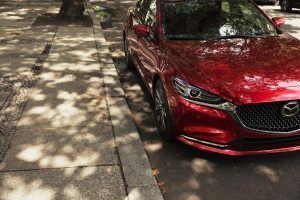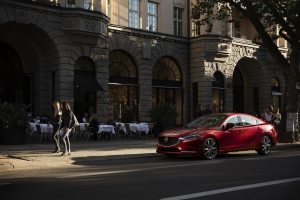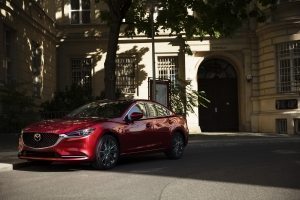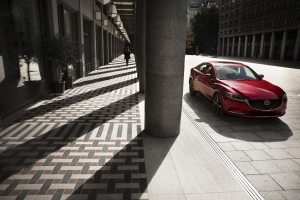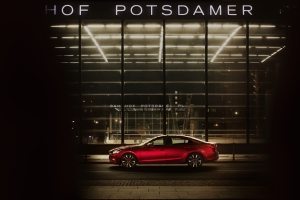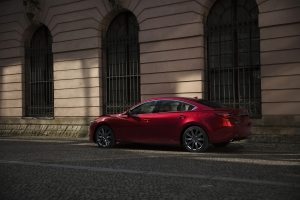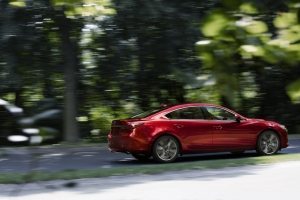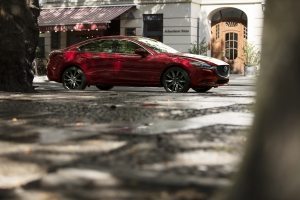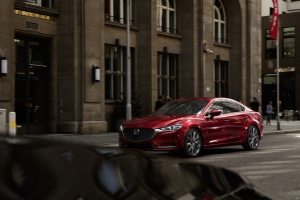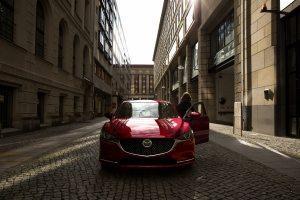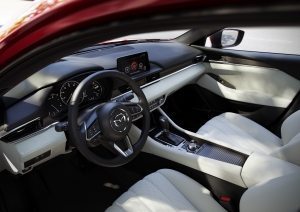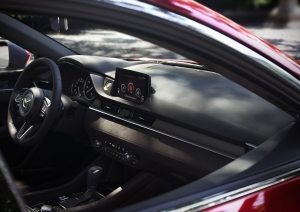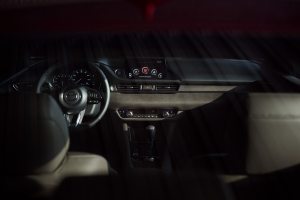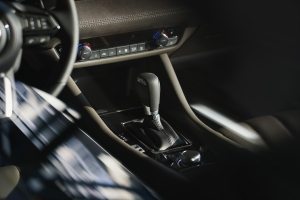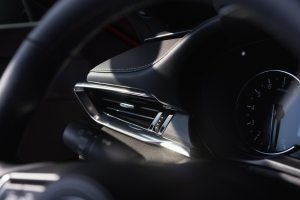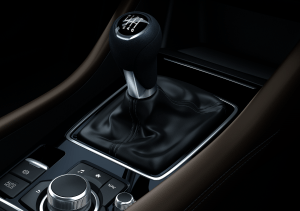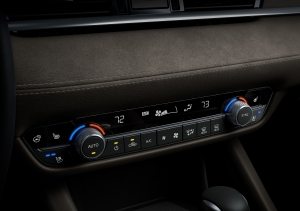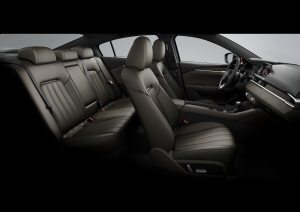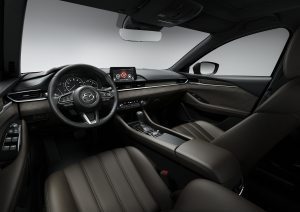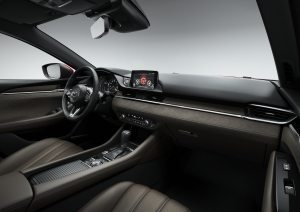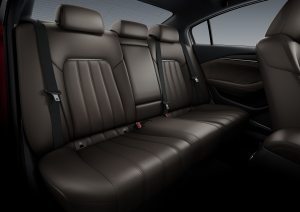News Releases
Cosmo. Luce. Millenia. CX-9 Signature. Mazda6.
These are but a small sample of the Mazda vehicles from the past 50 years that have embodied “Mazda Premium,” a set of guiding principles that complements the automaker’s human-centric design and engineering. Mazda uses these principles to build cars and crossover SUVs that compete in a class above, at a price that is readily affordable, offering a depth of engagement with its owner that satisfies at every touch point. With vehicles like these, it is Mazda’s goal to enrich people’s lives through a car ownership experience that celebrates driving, and to become a brand with which customers feel a strong emotional connection.
The re-engineered Mazda6 certainly delivers all of the above, elevating Mazda6 from its traditional competitive set into a higher class, with unparalleled craftsmanship, design and technologies for the driver who savors every moment behind the wheel. Yet, Mazda6 is also serene, thoroughly reworked underneath its sheet metal to deliver a refined experience befitting of a far more expensive car.
A Signature Path Forward
The 2016 Mazda CX-9 three-row crossover SUV was a remarkable step for Mazda. It once again elevated Mazda, showing if Mazda built an SUV with superior driving dynamics, class-above refinement, an abundance of amenities, technology and a strong engine, customers would come. After more than a year since going on sale, approximately 55 percent of all Mazda CX-9 crossover SUVs sold in the U.S. have been either high-level Grand Touring models or top-trim Signature models—an unusually high number.
The Signature trim level has been well received, selling more than twice as well as expected, and attracting customers who are trading up from traditional luxury brands.
It was natural, then, that Mazda would follow this plan with its flagship sedan. Mazda6 has received improvements every year it has been on sale. Updates for the previous model year added more sound insulation throughout its cabin and available Nappa leather interior appointments. Mazda6 also received standard G-Vectoring Control, a Mazda-exclusive technology that makes steering response more direct and linear by using a minute reduction of engine torque at turn-in to put extra weight on the front tires.
But simply adding Nappa leather and some new technologies does not a Signature model make.
Thus, Mazda6’s chassis has also been thoroughly revised to provide a more supple ride, greater agility and dramatically improved NVH. Mazda6’s Signature interior features authentic materials—brown Nappa leather whose color is inspired by the aged wood in ancient Japanese temples; UltraSuede® NU that is adorned with a subtle gold tint, using a similar technique to that which is used to make ornate kimonos; and Sen wood accents, a type of wood often used in taiko drums and Japanese furniture.
Perhaps the greatest upgrade of Mazda6 Signature is its source of motivation. Mazda’s award-winning, SKYACTIV-G 2.5T gasoline turbo engine returns for its second application. The SKYACTIV-G 2.5T is an engine renowned for its nearly instantaneous, ample torque, courtesy of its Dynamic Pressure Turbo, which accelerates exhaust gasses through a tiny inlet to quickly spool up its turbocharger at low RPM before opening a larger secondary passage to use throughout the engine’s operational range. The engine produces torque on par with a 4.0-liter V-8 engine. Mazda6 was already a class favorite among discerning drivers. These latest upgrades will launch Mazda6 above the mainstream sedan fray, changing the idea of what an affordable midsize sedan can and should be.
‘Mature Elegance’: A Design Vision
Mazda’s striking VISION COUPE concept that debuted at the 2017 Tokyo Motor Show portended a revitalized focus on elegance. Mazda6 carries a similar theme, called “Mature Elegance,” creating an added level of sophistication to Mazda’s KODO—Soul of Motion design language that complements its aspirational ambitions.
Up front is Mazda6’s new grille, which accentuates a look of depth, with a strong framework, low center of gravity and wide stance. Its standard LED headlights integrate fog lamps and carry a crisp, wide lighting signature. Painted surfaces extend lower on the body, and new 17- and 19-inch wheel designs complement the upgraded appearance. Finally, Soul Red Crystal paint makes its debut on Mazda’s sedan, joining Machine Gray Metallic and a full palette of available paint colors.
Inside, the interior is all-new, with only the steering wheel and small trim pieces carried over from its predecessor. Most noticeable is its horizontally stretched dashboard that accentuates Mazda6’s width and belies a sense of subtle sophistication. On Mazda6 Signature models, Sen wood, Nappa leather and UltraSuede® NU adorn the doors, seats and dashboard, providing an atmosphere that can coddle on Rodeo Drive just as easily as it can enliven spirited drives on Mulholland.
Technology Aplenty
Lest one thinks the new Mazda6 hasn’t received the technology to match its upscale interior, there’s more in store.
Mazda6’s front seats have been fully redesigned. They are wider, with high-density, vibration-absorbing urethane foam that creates a firm, supportive seating surface. Yet, they’re supple enough to keep the driver and passengers comfortable for long trips. Introducing next-generation seat materials and concepts, first seen at August 2017’s Mazda Frankfurt Technology Forum, Mazda6’s seats are designed to help keep front passengers’ spines in the natural S-shape humans use when standing.
Available ventilated front seats in Mazda6 are a first for the brand, and wick away warm air from the front passenger and driver’s backs to keep them cool. Rear seats have also been redesigned with high-density urethane foam, enabling greater comfort.
In addition to the seats, new technology comes by way of available features:
- 360⁰ View Monitor
- A reconfigurable 7.0-inch TFT gauge display in higher-trim models
- A new 8.0-inch MAZDA CONNECT infotainment display with sharper color contrast
- Available full-speed Mazda Radar Cruise Control with Stop & Go
- Windshield wiper de-icer
- Windshield-projected Active Driving Display head-up unit
Engines to Suit Customers’ Tastes
Mazda6 offers two powertrain options in the U.S., starting with the torquey, fuel-efficient SKYACTIV-G 2.5 naturally aspirated engine. Mazda6’s 2.5-liter, four-cylinder engine comes with a host of upgrades to reduce internal friction and improve efficiency across all RPM, and it adds a greater level of refinement. A new technology that is unique to Mazda in North America is cylinder deactivation in a four-cylinder engine. The outside two cylinders can shut down when the vehicle is operated at steady speeds between 25 and 50 mph, but all four cylinders work instantaneously when needed for maximum performance. A centrifugal pendulum has been adopted in the torque converter of the six-speed SKYACTIV-DRIVE automatic transmission, counterbalancing any vibration that might otherwise be felt when running on two cylinders. The result is an imperceptible switchover between two- and four-cylinder modes, yet with very tangible real-world efficiency benefits.
Higher-grade models will also be available with Mazda’s award-winning turbocharged SKYACTIV-G 2.5T engine. First available in the current-generation Mazda CX-9 midsize crossover SUV, the SKYACTIV-G 2.5T is a technological tour de force that produces 310 lb-ft of torque from just 2,000 RPM and 250 horsepower on 93-octane fuel (227 horsepower with 87-octane gasoline).
Mazda’s industry-first Dynamic Pressure Turbo builds boost nearly instantaneously by using a small inlet port to force air into its turbocharger, akin to how water velocity increases when one holds his or her thumb over a hose. From there, a secondary valve can open up at higher RPM for increased airflow and maximum horsepower. A pulse-scavenging 4-3-1 manifold that prevents exhaust backpressure and helps the engine breathe freely.
Cooled exhaust gas recirculation (EGR) is used to reduce combustion temperatures, preventing knocking and therefore reducing the need for fuel-enrichment (when extra fuel is dumped into the cylinders as a means to cool the engine). Many times when turbocharged engines fail to achieve EPA-estimated fuel-efficiency numbers in the real world, it is because laboratory tests don’t replicate the higher-load driving styles that necessitate fuel-enrichment.
In too many instances, turbocharged engines are mated to continuously variable automatic transmissions (CVT), operating in a narrow band of efficiency, sacrificing a connectedness between driver and car—a valued characteristic of all Mazda vehicles called Jinba Ittai. Mazda’s six-speed SKYACTIV-DRIVE automatic transmission, paired as standard to the SKYACTIV-G 2.5T engine, keeps its torque converter locked through most of its operation, giving a more connected sense of controllability than many other automatic transmissions.
Both engines complement Mazda6, with the naturally aspirated engine serving as an all-around efficient, responsive powertrain and its turbocharged sibling amplifying the driving performance for which Mazdas are known.
Finally, as a champion of the manual transmission, Mazda6 will continue to offer the SKYACTIV-MT, paired with the SKYACTIV-G 2.5 engine.
But What’s an Engine without a Chassis?
In this latest round of thoughtful improvements, engineers have revisited every aspect of Mazda6’s chassis, with its suspension offering a smoother, more linear ride quality and greater NVH refinement similar to the ultra-quiet CX-9. Its steering rack is now rigid-mounted to the chassis, offering greater steering response and feel, and its SKYACTIV-CHASSIS has been stiffened in complement with the revised suspension to offer both a smoother ride and to improve outright dynamic performance.
Enabling this more comfortable ride without compromising the Mazda6’s handling, the suspension geometry has been revised, with roll-steer changes that promote more neutral handling.
Additionally, body reinforcements, thicker sheet metal in the rear wheel-wells, reinforced chassis bracing and even thicker suspension trailing link mounts help improve interior conversation sound quality, putting Mazda6 into rarified air when it comes to quietness, refinement and capabilities.
In Pursuit of Premium
In pursuit of premium, an engine isn’t enough. A chassis isn’t enough. An elegant interior and world-renowned design aren’t enough. Refinement and technology aren’t enough.
But together, they complete what Mazda expects to be yet another step to elevate the brand beyond the realm of mainstream vehicles, offering a “Mazda Premium” experience that will delight customers. As with its predecessor, the new Mazda6 will land among the world’s best cars, for those who love to drive. But it will aim higher, moving Mazda’s consideration with customers to a new, class-above place, because Mazda never stops challenging.
The re-engineered, refined Mazda6 is expected to go on sale in spring 2018.

